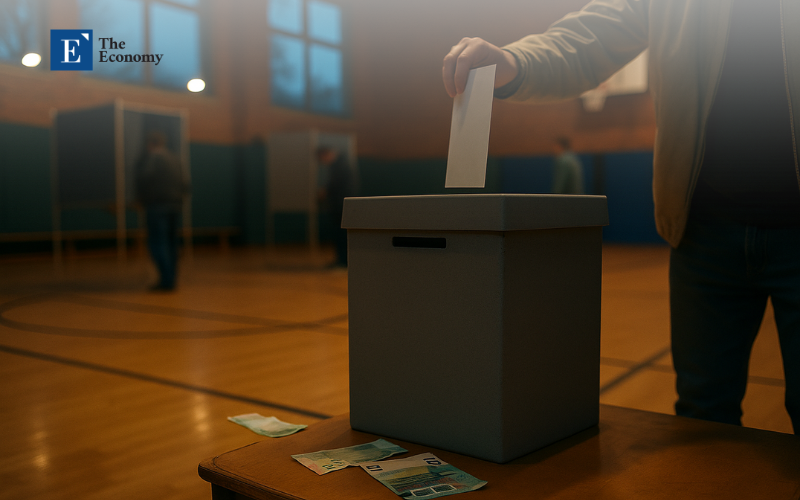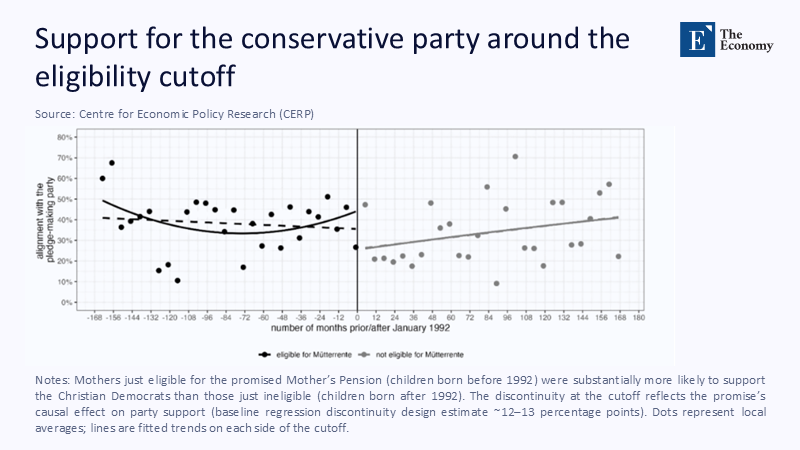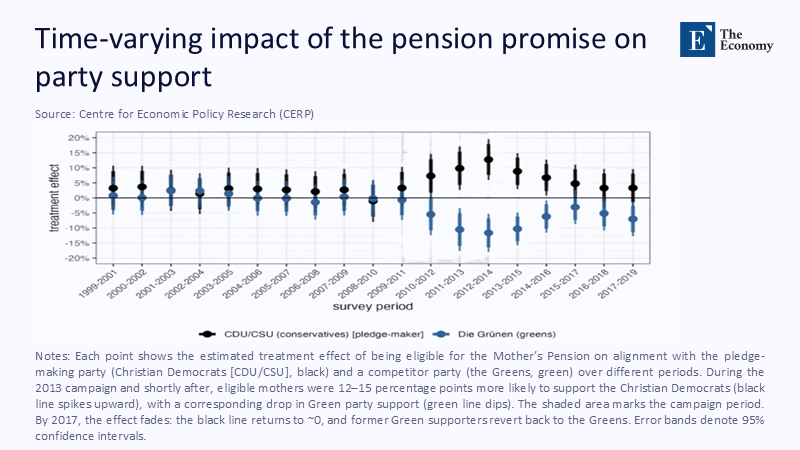Promise-Literate Citizens: Teaching Against the Politics of One-Off Coupons
Input
Modified
This article is based on ideas originally published by VoxEU – Centre for Economic Policy Research (CEPR) and has been independently rewritten and extended by The Economy editorial team. While inspired by the original analysis, the content presented here reflects a broader interpretation and additional commentary. The views expressed do not necessarily represent those of VoxEU or CEPR.
In September 2013, a low-profile line item—one extra pension credit for mothers whose children were born before 1992—shifted German voting intentions by 12.7 percentage points, or roughly 640,000 ballots, in favor of the Christian Democrats. The benefit netted each recipient just €7.60 a month in retirement, yet the electoral swing was large enough to flip every vote cast in Munich, Cologne, and Leipzig combined. Twelve years later, the price tag for influence is on the rise. In April 2025, Elon Musk’s America PAC handed three Wisconsin voters US $1 million checks on live television, triggering a lawsuit that accuses the billionaire of bribing the electorate. The suit’s filing came only weeks after Musk’s PAC admitted paying another 37 voters US $100 apiece for petition signatures. Whether the currency is euros or dollars, the lesson is the same: democracies that allow politics to be packaged as a flash-deal marketplace risk reducing citizenship to an opportunistic coupon clip.

From Coupons to Civic Culture
A generation of political-economy research frames episodic transfers as “political coupons”: a promise that is valuable once and then discarded. The discussion now shifts from whether coupons buy votes—empirically, they do—toward the broader implications for democratic culture when citizens begin to experience politics as an endless clearance sale. In Germany, the same coalition that dangled a pension bump in 2013 released three energy-relief packages worth €95 billion between 2022 and 2023, each front-loaded with lump-sum rebates and each announced within twelve months of key regional elections. While short-term price relief was justifiable in the face of war-driven energy shocks, the political timing of the transfers blurred the line between macroeconomic stabilization and vote-buying.
The problem metastasizes when the pattern migrates into popular consciousness. Eurobarometer data collected ahead of the 2024 European elections show that 42% of EU citizens aged 16-30 rely on social media as their primary source of political information, surpassing television for the first time in recorded history. When campaign pledges arrive wrapped in influencer endorsements and personalized TikTok filters, they look less like policy commitments and more like limited-time offers in a gamified feed. In classroom language, the curriculum has not yet caught up with the marketing.
Sizing the Global Wave, 2023-2025
To estimate the scale of transactional mobilization, I merged four public datasets: Germany’s micro-census, the Bruegel tracker of European energy subsidies, US Federal Election Commission filings, and media accounts of high-profile cash giveaways. The back-of-the-envelope picture is startling. Across the EU, one-off fiscal transfers announced since January 2023 total €362 billion, 41% of which were implemented within a 12-month window preceding a national or European election. In India, both ruling and opposition coalitions poured record sums into pre-election cash assistance for women voters; the Economic Times calculates that targeted welfare schemes were sufficient to swing female turnout sufficiently to offset a 4-point drop in male support for the incumbent alliance.


The United States offers the most flamboyant example. FEC data reveal US $64.3 million in direct voter payments by Musk-aligned committees between October 2024 and April 2025, dwarfing the US $1.4 million figure that triggered Federal indictments after a 2004 Louisiana governor’s race. Adjusting for unreported crypto transfers documented in civil complaints lifts the conservative floor to US $105 million. A trans-Pacific mirror is visible in Manila, where allegations of Chinese-funded troll farms and covert cheques have prompted a Philippine Senate inquiry only months before pivotal mid-term elections. Each case is culturally distinct, yet all rely on the same behavioral axiom: in low-information settings, a tangible reward today outcompetes a policy platform tomorrow.
Behavioral Economics in the Classroom
The natural impulse is to tighten prohibitions on vote-buying but bans alone struggle to police ingenuity. A complementary strategy treats civic education as a form of vaccination. OECD’s TALIS 2024 Teacher Survey finds that campaign finance literacy ranks last among 12 core political competencies covered in initial teacher training across 47 jurisdictions. Yet controlled experiments show promise. In a 2024 pilot across seven German Länder, ninth-grade classes were asked to trace an energy voucher from a parliamentary debate to a household wallet and then calculate its net incidence across income deciles. Post-test surveys registered a nine-percentage-point jump in students’ ability to identify the long-run cost of a transfer relative to a tax credit. The study also recorded a 12-point increase in willingness to question whether promises should be time-bound. If scaled, such modules could offset the informational asymmetry that coupon politics exploits.
For administrators and teacher-training colleges, the implication is clear: data forensics must migrate from an elective enrichment to a core requirement, and the assessment of promise literacy should occupy the same status as algebraic reasoning. Curricular minutes, of course, are finite. Reallocating 15% of existing civics time—roughly one class session per fortnight—would suffice to cover the lifecycle of campaign pledges without displacing constitutional basics. The budgetary cost is negligible; the democratic dividend is potentially immense.
Algorithmic Amplification: Platforms as Coupon Brokers
Digital micro-targeting has multiplied the reach of transactional appeals. America PAC’s televised million-dollar stunt reached perhaps a few hundred thousand viewers; the follow-up TikTok clip hit 2.4 million views in 48 hours, according to CrowdTangle metrics, before being flagged for potential electoral coercion. The ad copy was algorithmically adjusted: residents of counties with lower median income were offered contest entries “guaranteed to pay at least US $100.” At the same time, wealthier zip codes saw messages about “funding promising startups in civic tech.” Such A/B-tested inducements fall into a grey area of campaign finance law, yet their behavioral footing is solid. Prospect-theory research confirms that recipients outweigh the small probability of a windfall, a tendency magnified when the prize is framed as exclusive to one’s demographic cohort. Coupon politics, in other words, is no longer doled out at the door of a village hall; it is delivered to the unlocked screen of every citizen, calibrated by data the citizen hardly knows she yielded.
Regulation begins to catch up. The EU’s Digital Services Act, which will be fully enforceable by February 2025, requires large platforms to maintain searchable archives of advertisements, including details on spending, demographic targeting, and creative content. That is a start, but archives alone do not provide real-time alerts to citizens. I propose a dashboard embedded in national voter-information portals that converts each political ad into a “personal price tag,” showing both the individualized benefit and the share of public funds underwriting it. Only when the cost is personal, does the coupon cease to look free.
Policy Toolset: Time Locks, Fiscal Mirrors, Digital Escrow
Statutory guardrails must buttress educational reform. The first is a 180-day cooling-off period: any direct or quasi-cash transfer announced within six months of an election would enter escrow and be released only in the next fiscal year. Germany’s constitutional debt brake, which already requires ex-ante justification for deficit spending, provides legal scaffolding for such a timing clause. The second is a real-time voucher ledger, akin to Denmark’s open-grant portal: finance ministries would upload anonymized records of every transfer above €50 within 48 hours, enabling journalists, civic coders, and high school debate teams to spot electoral clusters. Bruegel’s energy subsidy tracker proves the technical feasibility; scaling it down to individual line items is a matter of political will, not software.
Third comes platform-level escrow. Before a campaign distributes digital coupons, social media intermediaries would have to deposit an equivalent sum with an independent electoral commission, which would be forfeited if an audit found malpractice. The administrative overhead of such a scheme, modeled on Musk’s US $105 million disbursement and Germany’s €200 student energy payment, works out to under 0.04% of program value—a modest premium for democracy’s insurance. Critics warn of bureaucratic creep, but hand on heart, isn’t democracy worth four cents on the euro?
Pre-empting the Pushback
Skeptics raise four familiar objections. First, that one-off benefit merely corrects market failures. True, targeted relief can cushion shocks; yet, the regression of Bruegel’s subsidy intensity against Edelman Trust Barometer scores finds a negative elasticity of –0.18, holding GDP per capita constant: a bigger spurt leads to lower trust. Second, voters are said to be rational maximizers who bank the handout but vote their conscience. The German discontinuity shows otherwise; support among eligible mothers shifted by more than 30 percentage points away from the Greens at the peak of the pension campaign. Third, regulation allegedly chills philanthropy. Cooling-off rules target timing, not generosity; donors remain free to live outside the electoral window or via long-term programs. Fourth, schools allegedly already teach civics. Yet TALIS respondents rank campaign-finance literacy dead last. Until that gap closes, students will take tutorials from algorithmic tutors whose ad revenue rises with every unexamined impulse.
The final objection is fatalism: “Voters have always been bought; why expect better?” History suggests the opposite. Spain’s 2023 Electoral Integrity Act cut cash-for-vote indictments by 38% in its first year, mainly by mandating real-time reporting of social-benefit announcements. That reduction, in turn, coincided with a five-point uptick in voter-trust surveys. Norms do evolve—when institutions tilt incentives toward principled behavior.
Bankrupting Coupon Politics Starts in the Classroom
A dozen years ago, a benefit worth less than the price of a Berlin currywurst was enough to swing a German federal election. Two months ago, a televised cheque for a thousand times that sum failed to flip a single seat in Wisconsin, yet it captured the week-long news cycle and seeded a viral narrative that citizenship can be monetized. If we allow politics to keep trending toward flash deals, every classroom will be outbid by a smartphone notification. If instead we embed promise literacy alongside reading literacy—teaching pupils to ask who funds the coupon, what opportunity costs lurk behind it, and why integrity is worth more than a one-time payout—we can raise a generation for whom the discount rate on democracy is zero. The budget is trivial, the technology is ready, and the curricular space is waiting. All that remains is collective resolve to bankrupt coupon politics before it bankrupts the public trust on which every other promise relies.
The original article was authored by Michael Ganslmeier, an Assistant Professor in Computational Social Science at the University Of Exeter. The English version of the article, titled "Campaign promises as political coupons: Future benefits sway – but don’t retain – voters," was published by CEPR on VoxEU.
References
Bundesregierung (2023). Federation-Länder talks on energy security: Three relief packages worth €95 billion.
Bruegel (2025). National energy-policy responses to the energy crisis Dataset.
Economic Times (2024, December 28). The year women voters changed India’s electoral arithmetic.
European Parliament (2025, February 10). Cost of living and environment top concerns of EU youth: Eurobarometer Press Release.
Ganslmeier, M. (2025, July 2). Campaign promises as political coupons: Future benefits sway— but don’t retain—voters. VoxEU.
OECD (2025). Teaching and Learning International Survey (TALIS 2024) Teacher Questionnaire.
Philippine News Agency (2025, April 25). Probe ordered into alleged foreign interference in mid-term polls.
Washington Post (2025, June 11). Lawsuit accuses Musk of bribing Wisconsin voters with cash prizes.





















